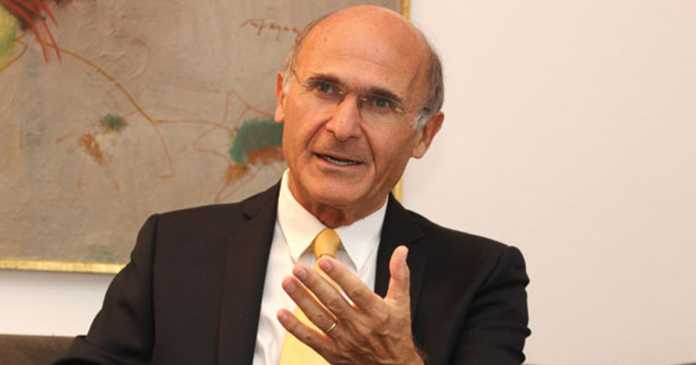The bells are ringing for war for Great Russia

The state interest, the very survival of the two nuclear powers today, America and Russia, points to the necessity of avoiding war between them, and yet, after the Russian aggression and after the Western support for Ukraine, the events seem to point in that direction. Like powerful ocean currents, those events drag toward nuclear disaster
The bells are ringing for war for Great Russia. "Go bravely to do your military duty." And remember, if you die for your country, you will be with God in his kingdom", is the appeal of the head of the Russian Orthodox Church, Kirill. War for what? Against the "Nazi" regime in Kyiv? Against the West's attempts to invade and destroy Russia? No. With the referendum underway in the Russian-populated areas of Ukraine and the decision of the Russian Duma to give legitimacy to the annexation, things are becoming clearer.
As someone who knows that game in the Balkans, I think one could conclude that this is a war for Great Russia. A Russia in which all Russians will gather, or as many as possible. Namely, with the collapse of the Soviet Union, the largest diaspora in the world was created. Overnight, 30 million Russians found themselves outside the borders of the new sovereign state – the Russian Federation. And while Milosevic immediately started a war to redraw the borders of the former Yugoslav republics, future sovereign states, Yeltsin resigned himself to the fact that the borders of the Soviet republics would become international borders. But it is not to the will of his successor. It is finally becoming clearer what Vladimir Putin lamented for years, saying that the biggest strategic mistake of his country was the collapse of the Soviet Union. It was certainly not from the desire to live in a democracy with "one hundred and one nations", as the propaganda of the time said, covering the fact that the Russians dominated the rest of the nations. Putin lamented the fate of the Russian population and the territories they live on. Putin's speech on the eve of the Russian aggression against Ukraine, that incomprehensible babble over the fate of the Russian nation and the "artificial" Ukrainian state, was, in fact, his justification for what would follow: the invasion and seizure of the territory of a sovereign European state. As always, the drums of nationalism and war beat to the same beat.
How did we allow such a heated confrontation between nuclear powers to occur that almost exploded into a world nuclear war? Where did we go wrong? As an active participant in the Conference on Yugoslavia, I can testify to the great expectations regarding peace and democracy in Europe, which prevailed after the victory of the West in the Cold War. Force has no place in today's Europe, we were told at the Yugoslavia Conference by Western politicians and diplomats. What is new on the European continent, said this argumentation, is that imperialist powers no longer impose solutions, because for the first time in our history we live in a Europe in which all states respect the principles of the inviolability of borders, the principles of democracy, human rights and freedom.
Of course, we all know that things did not turn out exactly like that: the bloody ethnic wars in Yugoslavia only confirmed the argument of the realist school in international politics, that force and not law is what determines relations between nations. Against the reality was the rhetoric that the end of history had come, that liberal democracy had definitively defeated dictatorships, that law would maintain the international order established after the Second World War and written in the UN Charter. The idealist school again gained primacy over the realists in international relations. But without realistic learning, as we see, terrible mistakes can be made.
We have forgotten the lesson of Thucydides, who, analyzing the course of the war between Athens and Sparta, advises the "great powers" of his time to be cautious in involving themselves on the side of a small city-state, which would involve them in a military conflict that brings more harm than benefit and is not in their national interest. The state interest, the very survival of the two nuclear powers today, America and Russia, points to the necessity of avoiding war between them, and yet, after the Russian aggression and after the Western support for Ukraine, the events seem to point in that direction. Like powerful ocean currents, those events drag toward nuclear disaster.
Namely, America and Russia are most directly involved in the Ukrainian war. Russia in redrawing the borders of a sovereign European state according to some Russian ethnic lines, and America in defense of the previous world order, which was based on the UN Charter and international law. But international law has nothing to do with international politics in which power tanks over legal obstacles. Namely, the millennial principle of Thucydides is still valid: "The strong do what they can, and the weak what they must." But if the relationship between the strong and the weak is clear, what do we do when the strong who possess nuclear weapons collide, the use of which would mean the end of humanity. Is it worth America and the EU on one side and Russia on the other, to start a nuclear war for Ukraine? Is it worth it for Ukraine to be the first victim of that war?
When Kennedy faced the Cuban Missile Crisis in the XNUMXs, he did two things. First, he decisively showed the Soviet Union that he was ready to enter a nuclear war and announced a blockade of the island with American warships, and, second, he immediately sought official and private avenues of contact with the leadership of the USSR to find a peaceful solution. As in the Cuban crisis, behind the curtain of international politics, a feverish search for a peaceful solution to the Ukrainian crisis should take place.


